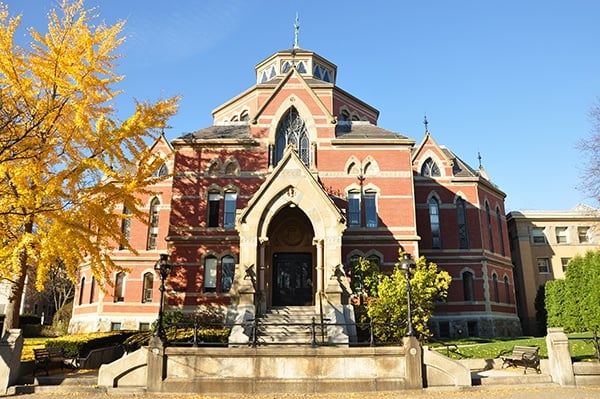
At many high schools, AP courses are the toughest classes you can take. Extremely competitive colleges are looking for students who are willing to challenge themselves, so they're more likely to admit students who have taken at least a few APs.
In this article, I'll go over how many AP classes Ivy League schools expect you to take and how these expectations can change based on the conditions at your high school.
How Many AP Courses Do Ivy League Schools Expect Students to Take?
There's no concrete answer to this question because it depends on how many APs your school offers and how many of them your classmates are taking. Ivy League schools want to admit the best students in the country while also maintaining diversity in their student bodies. They will only consider students who are performing at the top of their high school classes, but they also make an effort to admit applicants from a wide range of different environments and types of schools.
You might only take two AP classes your senior year because those are the only ones available to you. In this case, you will compare favorably to other students at your high school since you're making the most of your opportunities (and no one else will be taking more APs than you). A student at another high school who elects to take three AP classes senior year might not look as good if other students at the same school are taking five.
When admissions officers look at applicants from a certain secondary school, they may use the fact that one student took fewer AP classes than others in the group as an excuse to demote that student to the waitlist. This isn't always the case, though. If you take three AP classes in core subject areas, and someone else takes five but two of them were irrelevant to that student's interests, schools probably won't make much of a distinction between you. Top colleges are looking for students who have taken advantage of their opportunities, which means taking the most difficult courses available that fit with their interests.
If you're looking for a specific number of APs that you should take, it will depend on your school's offerings, but a safe number for admission at Ivy League schools is usually between 7 and 12 AP classes throughout high school. It's best to spread out these classes over four years with the majority of them clustered in your junior and senior years. Freshman year you might take one or two AP classes if they're available. Sophomore year you can ramp it up to two or three. Junior year, if you're hoping to attend an Ivy League school, you should consider taking three to five AP classes in core subject areas.
Avoid overloading yourself too much during your senior year because you'll be applying to college. Still, many students who apply to Ivy League schools take five or six AP courses senior year. It's up to you to decide how much you can handle without feeling overwhelmed or dropping the ball in any of your classes.
 Why? Why did I do this to myself? The binders. So many binders. (Don't let this be you.)
Why? Why did I do this to myself? The binders. So many binders. (Don't let this be you.)
Here are some quotes from Ivy League admissions websites to give you a better sense of what these schools are looking for:
Princeton Says...
"We consider it a promising sign when students challenge themselves with advanced courses in high school. We understand that not all secondary schools offer the same range of advanced courses, but our strongest candidates have taken full advantage of the academic opportunities available to them in their high schools."
"Whenever you can, challenge yourself with the most rigorous courses possible, such as honors, Advanced Placement (AP) and dual-enrollment courses."
Columbia Says...
"We look at a variety of factors to help us inform our decision on a candidate including:
The student's curriculum and grades - we hope to see that a student is challenging herself or himself with a rigorous course load.
The context of a particular candidate, including family circumstances, secondary school, community, interests and access to resources."
Brown Says...
"To assess preparedness, we review the depth and breadth of the academic learning you have undertaken thus far. We want to know whether you have taken advantage of the courses available to you in your school, and whether you have challenged yourself in advanced classes, and whether you have stretched yourself with outside-of-school educational opportunities."
"We know that curricular offerings vary from school to school. Our strongest candidates have taken full advantage of what is available to them in their own schools."
The gist of these statements is that you need to challenge yourself as much as possible in the context of the opportunities your high school provides for you. With that in mind, don't just take any and all AP courses that your school offers. Think critically about which courses are most relevant to your interests and goals. Also, make sure you're not sabotaging your GPA by taking more classes than you can handle. I'll go into more detail on this in the next section.
 Brown University: Once you get in, you can take whatever classes you want!
Brown University: Once you get in, you can take whatever classes you want!
Are Some AP Courses Better Than Others in the Eyes of Ivy League Schools?
Don't take an additional AP class on top of your regular course load if the subject doesn't interest you. I would advise you to take AP courses primarily in core subject areas to avoid stretching yourself too thin. Taking AP classes just for the sake of adding another AP to your course record may be damaging to your GPA as a whole. It also won't add much to your college application. Ivy League schools want you to take the most challenging classes in math, science, social studies, English, and foreign language. If you take all APs in those subject areas but skip AP Music Theory, admissions committees won't fault you for it.
Some people mistakenly believe that you should take as many AP classes as possible at all costs. You should take full advantage of your opportunities in areas that interest you, but you shouldn't devote time and energy to classes that are unrelated to your goals and academic interests. Colleges want to see students who prioritize worthwhile learning experiences over hollow achievements. They're also looking for students with very high GPAs. Stay balanced: You don't want to overload your schedule with too many hard classes and end up with lower grades overall.
 The eyes of the Eye-vy League are watching youuuuu.
The eyes of the Eye-vy League are watching youuuuu.
What If Your High School Doesn't Have AP Courses?
Some students worry about their chances at top colleges because their school doesn't offer AP classes. In this situation, just take the hardest classes that are available to you. You shouldn't be concerned about the lack of APs. Colleges will understand that you didn't have the opportunity to take them, and they can't fault you for that.
Your school may offer IB courses instead, which colleges view as being essentially equal to AP courses. As I've said before, Ivy League schools will compare you to other students from your high school to see how you measure up. If you're pushing yourself as much as you can within the academic constraints of your environment, you'll still have a good chance of being accepted.
A student who doesn't have access to APs but takes high level classes throughout high school and is ranked in the top five percent of his or her class will have a better chance of attending an Ivy League school than a student who takes a few AP classes here and there and has a less impressive class ranking.
 If your school doesn't have APs, it's ok. Shhhh. Listen to this rock.
If your school doesn't have APs, it's ok. Shhhh. Listen to this rock.
Conclusion
Ivy League schools and other competitive colleges are looking for students at the top of their high school classes who have taken the most rigorous courses. These often include AP classes.
Most students who attend extremely selective schools have taken anywhere from 7 to 12 AP courses in high school, although there are exceptions to this rule. If a high school offers only a limited number of AP courses or none at all, colleges will not fault students for taking fewer of these classes. Above all, they want to see students who have challenged themselves as much as possible within the constraints of their high school curriculum.
The bottom line is, if you want to attend one of the most competitive schools in the country, you should strive to take as many difficult courses as possible without overwhelming yourself and sabotaging your GPA. For some students this means taking all three of the AP classes their school offers, and for others it means choosing to take twelve AP classes out of the twenty their school offers. As long as you do the best you can to challenge yourself academically, there's no absolute number of AP classes you need to take to be admitted to a top college.
What's Next?
Still trying to figure out how to structure your schedule? Learn what a rigorous course load in high school should look like.
If you're hoping to be admitted to competitive colleges, it's helpful to join an honors society. Find out more about honors classes and societies that you can be a part of in high school.
Your GPA is critical in the college admissions process. Read this article for more information on whether colleges consider weighted or unweighted GPAs and how this might affect you.












